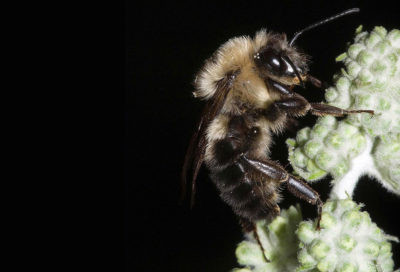During the 2017 total solar eclipse, bees located in the path of totality essentially ceased flying as darkness fell. Susan Ellis / Bugwood.org
As a strip of darkness fell across the continental United States during last year’s total solar eclipse, bees in the path of the rare celestial event went abruptly and completely silent for several minutes. The sudden halt in buzzing was caught by tiny microphones set up by more than 400 students, teachers, and volunteers in the path of the total eclipse as part of a massive citizen science experiment.
The citizen scientists set up microphones in 16 locations in Oregon, Idaho, and Missouri near bee-pollinated flowers and far away from foot and vehicle traffic. The bees remained active during the partial-eclipse phases. But when the sun disappeared entirely, the buzzing noise made by bees’ wings as they flew suddenly stopped. (Just one buzz was recorded during totality in all of the 16 monitoring locations.) It resumed again a few minutes later as the moon moved out of alignment and the sky became brighter. The bizarre behavior was detailed in a study published this week in the journal Annals of the Entomological Society of America.
“We had not expected that the change would be so abrupt,” Candace Galen, a professor of biological sciences at the University of Missouri and the lead author, said in a statement. “That bees would continue flying up until totality and only then stop, completely. It was like ‘lights out’ at summer camp.”
Scientists and naturalists have long noticed that animals and insects react to eclipse events, according to The Atlantic. In 1239, Italian monk and astronomer Restoro d’Arezzo wrote, “all the animals and the birds became frightened, and the wild beasts could be captured with ease.” Scientific literature and writing is littered with similar observations from over the centuries. Light-dependent marine organisms, like zooplankton, swim to the ocean surface during an eclipse. And the Nashville Zoo last year reported that one species of parakeet also fell completely silent during the darkness.
